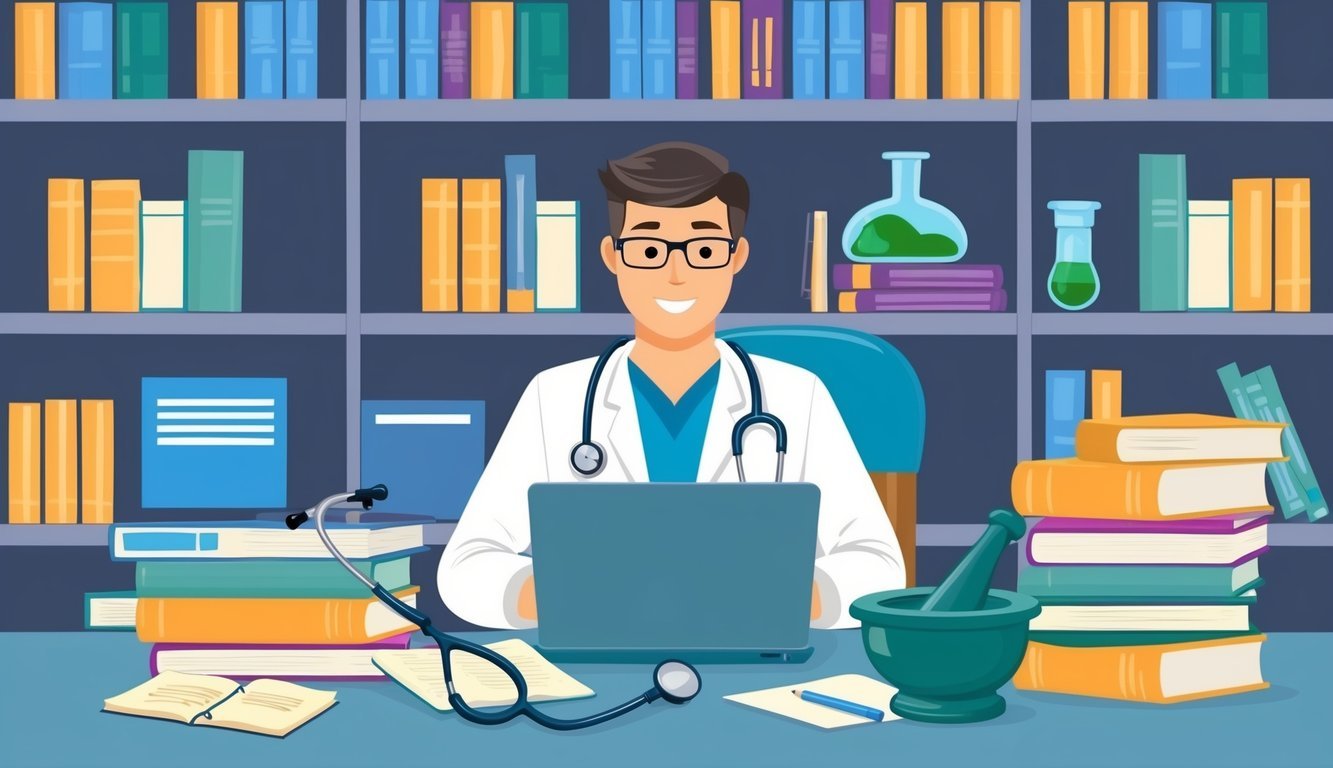The path to becoming a pharmacist often raises the question: Is being a pharmacist hard? While the answer can vary based on individual perspectives, the demands of the role make it a challenging career.
The role includes long hours, rigorous education, and high responsibilities.
However, many find it rewarding as they contribute significantly to patient care and public health.
As you explore the daily responsibilities and environments pharmacists work in, you’ll understand the skills needed to succeed in this field.
Balancing the complexity of medications with the personal interactions required to educate patients adds layers of both difficulty and satisfaction to the job.
By weighing the pros and cons, you will gain insights into whether a career in pharmacy aligns with your goals.
The challenges can be significant, but so can the rewards of helping others and advancing in a vital healthcare profession.
Key Takeaways
- The journey to becoming a pharmacist requires extensive education and training.
- Pharmacists play a crucial role in patient care and public health.
- Understanding the job’s challenges helps you decide if this career is right for you.
Educational Path to Becoming a Pharmacist

Becoming a pharmacist requires a thoughtful approach to education and training.
It involves several key steps, including earning a relevant degree, passing licensure examinations, and considering ongoing educational opportunities.
Prerequisites and Pharmacy Degree
To become a pharmacist, you first need to meet certain prerequisites.
Most aspiring pharmacists start by earning a bachelor’s degree in a science-related field or completing at least two years of undergraduate coursework.
This foundation prepares you for the Pharmacy College Admission Test (PCAT), which is often required for admission into a pharmacy school.
Once accepted, you will pursue a Doctor of Pharmacy (PharmD) degree, which typically takes four years to complete.
Courses include pharmacology, medicinal chemistry, and clinical training.
Participating in hands-on experiences through internships or rotations is essential.
This practical exposure helps you develop skills needed to succeed in the field.
Licensure and Certification Examinations
After earning your PharmD degree, you must pass the licensure examinations to practice as a pharmacist.
The primary exam is the North American Pharmacist Licensure Examination (NAPLEX), which assesses your knowledge and skills in pharmacy practice.
Additionally, many states require passing the Multistate Pharmacy Jurisprudence Examination (MPJE), focusing on pharmacy laws and regulations.
It is important to check your state’s specific requirements and ensure you are well-prepared for these challenging exams.
Postgraduate Opportunities and Continuing Education
Once licensed, you might consider postgraduate opportunities, such as residencies, to gain specialized skills.
A residency typically lasts one to two years and offers advanced training in areas like clinical pharmacy or specialty practice.
Continuing education is also vital for maintaining your license and keeping your knowledge up to date.
You might engage in courses offered by the Board of Pharmacy Specialties (BPS) or other recognized institutions.
Staying current with new medications and treatment protocols is essential for providing the best care to patients.
Roles and Responsibilities of Pharmacists
Pharmacists play a vital role in the healthcare system.
Their focus is on managing medication and ensuring patient safety.
They also work in specialized fields that enhance patient care and increase medication effectiveness.
Medication Management and Patient Care
As a pharmacist, you are responsible for medication management and patient care.
This includes ensuring patients receive the correct prescription medications.
You also educate them about proper usage, potential side effects, and drug interactions.
Key Responsibilities:
- Medication Therapy Management: You assess each patient’s medication plan to ensure safety and effectiveness.
- Immunizations: Many pharmacists provide immunizations, helping to protect public health.
- Consultations: You offer advice on the best practices for managing chronic conditions through medication.
Community pharmacists are often the first point of contact for patients seeking health advice.
In a clinical setting, you work with healthcare teams to optimize treatment plans.
Specialized Fields Within Pharmacy
Your role can extend into various specialized fields within pharmacy, such as oncology, pediatrics, cardiology, and pharmacognosy.
Each area requires specific knowledge and skills that enhance patient outcomes.
Examples of Specialization:
- Clinical Pharmacists: They work directly with healthcare providers to tailor medications for specific patient needs.
- Consultant Pharmacists: These pharmacists provide expert advice in healthcare facilities about medication management.
- Community Pharmacists: They focus on general patient care and accessibility of medications.
By pursuing specialized fields, you can address unique patient populations and complex medical conditions, improving overall healthcare delivery.
The Pharmacy Work Environment

The work environment in pharmacy can vary greatly depending on the setting and emerging trends affecting practice today.
Understanding the differences in pharmacy settings and the rise of telepharmacy and specialization can help you gauge the challenges and opportunities within the field.
Community and Hospital Settings
In community settings, such as retail pharmacies, you interact directly with patients.
These settings often emphasize customer service, medication counseling, and managing prescriptions.
You may work alongside pharmacy technicians and pharmacy assistants, who help with daily tasks like filling prescriptions and handling customer inquiries.
Hospital pharmacies differ significantly.
You collaborate with physicians and healthcare teams to ensure proper medication use for inpatients.
Your role may include preparing IV medications, monitoring drug interactions, and providing expert advice on medication therapy.
Both settings require strong communication skills and attention to detail, but the pace and focus can be quite different.
| Setting | Key Responsibilities | Team Composition |
|---|---|---|
| Community | Patient counseling, prescription management | Pharmacists, Technicians, Assistants |
| Hospital | Medication preparation, patient monitoring, clinical advice | Pharmacists, Technicians, Physicians |
Emerging Trends: Telepharmacy and Specialization
Telepharmacy is becoming more popular, allowing you to provide services remotely.
This trend helps increase flexibility and access to pharmaceutical care, especially in rural areas.
You can conduct consultations, review medications, and maintain patient records from your home or a remote site.
Specialization is another important trend.
As the field grows, you might choose to focus on areas like oncology, geriatrics, or cardiology.
Completing a pharmacy residency can provide advanced training and open doors to specialized practices.
Both telepharmacy and specialization offer new paths for you in the pharmaceutical industry, enhancing your skills while meeting evolving patient needs.
Career Outlook and Advancement

The career outlook for pharmacists is positive, with steady demand and various paths for advancement.
Understanding the job market and opportunities for specialization can help you navigate your career effectively.
Job Outlook and Demand for Pharmacists
The job market for pharmacists is expected to grow by about 5% from 2023 to 2033, according to the U.S. Bureau of Labor Statistics.
This growth indicates a consistent need for pharmacists in various healthcare settings.
| Year | Median Salary | Number of Jobs |
|---|---|---|
| 2023 | $136,030 | 332,000 |
| 2033 (Project) | $142,140 | 349,000 |
As more people seek healthcare services, especially in an aging population, the demand for licensed pharmacists remains strong.
Many pharmacists work in hospitals, clinics, or retail environments, providing vital healthcare services.
Advancing in Pharmacy: Residency and Specialization
To advance in your pharmacy career, consider pursuing a residency or gaining specialty certifications.
Completing a residency can provide valuable hands-on experience and make you more competitive.
Some specialty certifications that can enhance your skills include:
- Board Certified Pharmacotherapy Specialist (BCPS)
- Board Certified Ambulatory Care Pharmacist (BCACP)
- Board Certified Infectious Diseases Pharmacist (BCIDP)
These qualifications can lead to better job opportunities and a higher pharmacist salary.
Specializing in areas such as oncology or pediatrics allows you to focus your career and meet specific patient needs.
For more details about pharmacy careers, you can refer to the Occupational Outlook Handbook.
Challenges and Rewards of a Pharmacy Career
A career as a pharmacist comes with unique challenges and valuable rewards.
Understanding these aspects can help you navigate the path to becoming a pharmacist.
Balancing Work-Life and Stress
Balancing work-life can be difficult in the pharmacy field.
Many pharmacists work long hours, including evenings and weekends.
This can lead to higher stress levels due to the demands of the job.
A pharmacist’s responsibilities include dispensing medicines, counseling patients, and ensuring patient safety.
This requires focus and attention to detail.
The pressure to avoid errors in medication is significant, as mistakes can have serious side effects for patients.
To manage stress, it’s important to establish a healthy work-life balance.
Taking breaks, pursuing hobbies, and having a support system can help you cope with the pressures of pharmacy work.
Pros and Cons of Being a Pharmacist
Being a pharmacist has distinct pros and cons.
Pros:
- High Compensation: Pharmacists often enjoy a lucrative salary, making this career financially rewarding. Many entry-level positions start at over $100,000 per year.
- Career Demand: With a growing need for healthcare, pharmacists are in high demand, ensuring job security.
- Patient Interaction: You have the chance to make a difference in patients’ lives by providing essential medication and health advice.
Cons:
- Extended Education: To become a pharmacist, you need to complete several years of education, including a Doctor of Pharmacy degree.
- Job Stress: Your role carries responsibilities that can be overwhelming, particularly during busy shifts.
- Limited Career Mobility: Advancement may require additional education or specialization.
Evaluating these factors can help you decide if a pharmacy career aligns with your goals and lifestyle.
For more detailed insights, refer to resources like Indeed.
Frequently Asked Questions

Pharmacy is a rewarding yet challenging profession.
You will face various obstacles, including educational demands and workplace stress.
Understanding these aspects can help you decide whether this career path aligns with your goals.
What are some common challenges faced by pharmacists in their profession?
Pharmacists often deal with a high volume of prescriptions, which can lead to long hours and pressure.
They must remain accurate while managing customer interactions and medication counseling.
These responsibilities can become overwhelming, especially during busy hours.
How does the stress level in the pharmacy field compare to other healthcare professions?
The stress level in pharmacy can be significant due to the precision required in medication dispensing.
Compared to other healthcare roles, pharmacists may face less direct patient care pressure but still contend with workload demands and regulatory issues.
This difference can make pharmacy feel less stressful than fields like emergency medicine but still challenging.
Can you describe the work-life balance for professionals in the pharmacy industry?
Work-life balance for pharmacists varies by setting.
Retail pharmacists may have more consistent hours, while those in hospitals might work shifts, including nights and weekends.
You’ll need to consider how hours and responsibilities align with your personal life and preferences.
What is the duration and rigor of the educational path to becoming a pharmacist?
Becoming a pharmacist typically requires at least six to eight years of education.
You must earn a Doctor of Pharmacy (PharmD) degree, followed by internships or residencies.
This pathway demands strong commitment and performance in a competitive field.
In what ways can the role of a pharmacist be both rewarding and demanding?
The role is rewarding as you play a crucial part in patient health by advising on medications.
However, it can be demanding due to high expectations for accuracy and communication.
Balancing these demands can be both satisfying and challenging.
What considerations should one take into account when deciding if a pharmacy career is the right fit?
Before pursuing a career in pharmacy, you should think about your interest in healthcare, your tolerance for stress, and the educational requirements.
Ensuring that your values and goals align with the demands of the profession is vital for long-term satisfaction.

